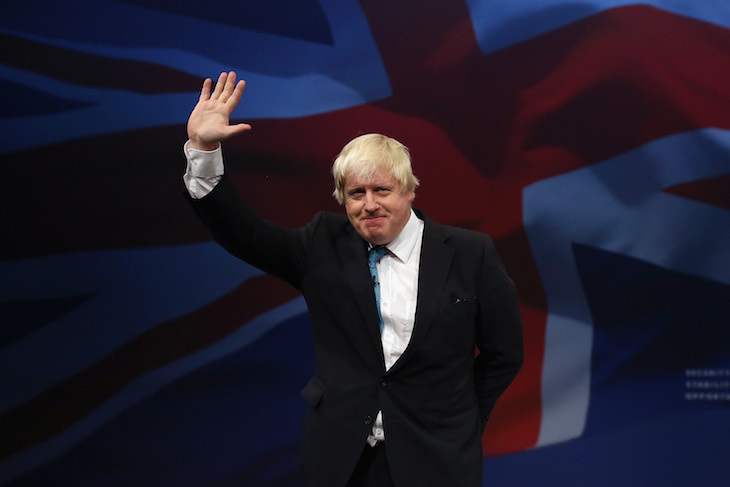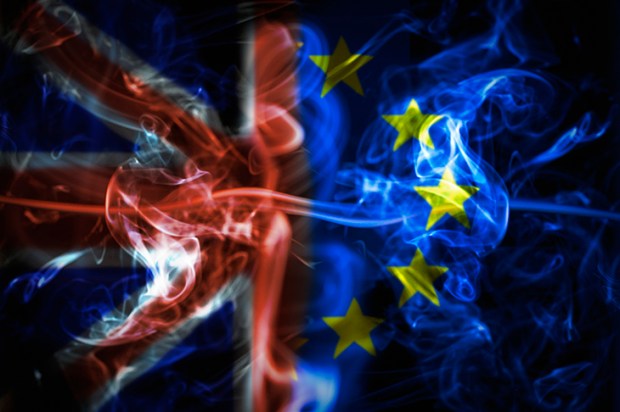My wife has decided she likes Dominic Raab, the latest poor sap to be despatched from a hamstrung, spasticated government to negotiate our exit from the European Union before a plethora of sniggering pygmies from the Low Countries. I think it’s the sound of his surname, those consecutive vowels, because I’ve noticed she also likes aardvarks and once expressed a wish to visit Aachen. I can’t think of many other reasons to like the chap. He surely knows what we all know, Leavers and Remainers alike — that the route our Prime Minister dreamed up one night while out of her box on skag, presumably, is not Brexit at all and would leave us in a far worse position than if we remained within the confines of that increasingly totalitarian bureaucracy.
It is in fact that thing which has become a hallmark of the staggeringly hapless May’s administration, the botched quick-fix designed solely to keep her in office for a few more weeks. Everybody knows this — in Europe and inside our government and out. It would have been better if she had said simply: ‘We’re not leaving the EU. That referendum counts for nothing, so stuff it. We, the establishment, know better, and we’re staying in.’ That would be far more honest, and preferable for the country too. These cosmetic genuflections to the will of the people become more emetic with every day that passes. Brexit in name only, to keep the plebs — the thick northerners, the racists, the England supporters, the, er, democrats — happy, because they know no better.
May was a Remainer, of course, so we understand that she does not have an ideological investment in Britain leaving the EU. It is why she should never have become Prime Minister. But she ascended to that hugely unlikely role because of political failures more grave than her own: the Tory Brexit-eers and, in particular, Boris Johnson.
I like Boris, personally. He is indeed capable of being witty and is good company. He has chutzpah. I don’t mind the buffoonish stuff, either — hell, not every senior politician needs to be as deathly boring as Douglas Hurd or Norman Fowler. And he gave me a column in this magazine, so I should be much more grateful.
But there is a strand of intense dimness running through that family which, when allied to an almost bizarre sense of entitlement occasioned by the most expensive upbringing that money can buy, plus a surfeit of ambition and an almost complete absence of principle, leads us to where we are now. The least effective foreign secretary in 60 years resigns and is hunkered down with his simpering groupies preparing for what he thinks is his birthright, i.e. to lead the country.
You must be joking, Boris. Is anyone convinced that Boris is a committed Brexiteer? Sure — I know from first hand his genuine disdain for the rules and regulations of the EU. But I suspect he opted for ‘out’ in 2016 because he thought there was more chance of personal advancement in taking that position. Which is also why I think he has now resigned. (‘Does another resignation weaken her fatally? Or will it weaken me if I do it?’ That was the calculation.) I don’t think leaving the European Union came into it.
And remember the debacle once we had voted to Leave — the complete absence of any senior figure from the Leave camp capable of stepping forward, a catastrophe of vaulting ambition, spite, misplaced hubris and real stupidity which left the Conservative party with a choice between Theresa May and some woman called Andrea.
I cannot remember a time when the British public — both the decisive majority who voted Leave, and the Remainers — have been more let down. Stupidity particularly — a familiar trope for the Tories, I suppose: the stupid party. Exacerbated by May’s decision to foist an unwanted election upon the country, with the result that her previously tricky position has now become patently impossible and untenable.
I see May’s current difficulty. I do get that. No working majority. A party and parliament (and establishment) which is for Remain, an electorate which expresses a clear majority for Leave. How to square the two? And the answer — pay lip service to Leave and the public will, while remaining. But that doesn’t work. And it plays into the hands of those with whom we are negotiating.
It should never have been quite this problematic. The European Union is itself in utter disarray. One by one the countries of central Europe are rebelling against the diktat from Brussels — primarily over immigration, but also over their rights to run their own countries as they see fit without being chastised by a perpetually zonked Luxembourgish panjandrum and threatened with sanctions.
And one by one, Eurosceptic parties or coalitions are winning elections. This is something we should have exploited from day one. We should make common cause with the Hungarians and the Greeks and Czechs and the Poles and the Austrians and the Italians. Oh, and of course the Catalans. Support them in their struggles against the very machine which we voted to be rid of. Tell Barnier we will pay not a single penny to the EU and that he can do his worst. Strike an immediate trade deal with the USA, Australia and China. If the EU threatens tariffs against our exports, do the same back: they lose more than we do. If this leads to a ‘hard border’ in Northern Ireland, so be it. We should leave the border soft, because that is what our people want. If the EU wishes to police it and set up customs posts from Donegal to Newry, let them, and then let the people of that island see who, exactly, is causing the problems. Call their bluff. It would be bumpy for a while. But scarcely less bumpy than it is now.
Got something to add? Join the discussion and comment below.
Get 10 issues for just $10
Subscribe to The Spectator Australia today for the next 10 magazine issues, plus full online access, for just $10.
You might disagree with half of it, but you’ll enjoy reading all of it. Try your first month for free, then just $2 a week for the remainder of your first year.















Comments
Don't miss out
Join the conversation with other Spectator Australia readers. Subscribe to leave a comment.
SUBSCRIBEAlready a subscriber? Log in